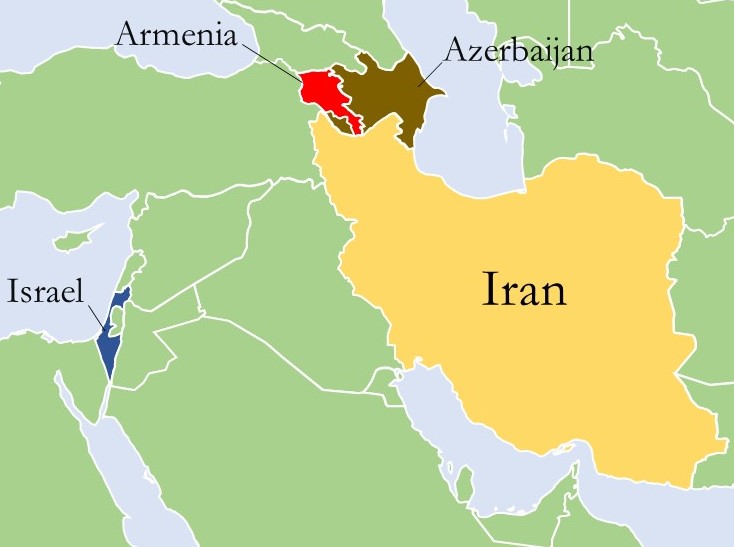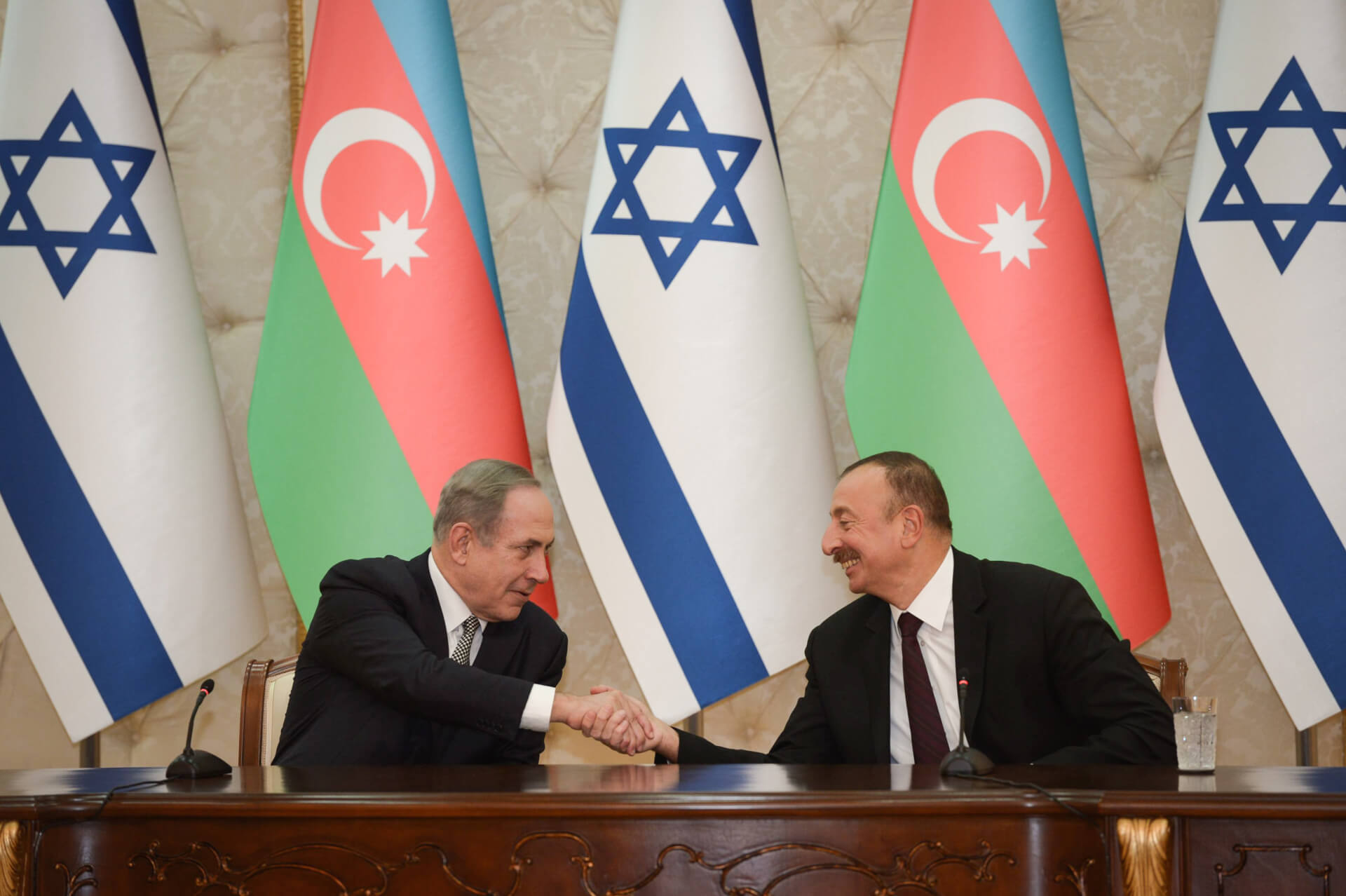Last week, Iran staged massive military drills near its 700-kilometre-long border with Azerbaijan in a show force that included artillery and armoured units, tanks, drones, and helicopters. The exercise was the largest Iranian war game in over a decade and was curiously named ‘The Conquerors of Khaybar’, a reference to the Battle of Khaybar in 629 CE, in which Muslims led by the Prophet Muhammad and Ali, the first Shia Imam, defeated the Jews of Khaybar near Medina.
Iran has claimed that the exercises were held because of a growing covert Israeli military presence in Azerbaijan. In fact, the Iranian Foreign Ministry stated, “Iran will not tolerate the Israeli regime’s presence near its borders even if it’s ceremonial [and] will take any actions it deems necessary to protect its national security.” Foreign Minister Hossein Amir Abdollahian said the exercises were meant as a warning to the “Zionist regime.” Furthermore, Supreme Leader Ayatollah Ali Khamenei said after the drills that the Iranian armed forces are a “defensive shield” against “the harsh threats posed by the enemies inside and outside the country.”
Iran’s display of its military might and the comments made by its leader and top officials show the regime’s concerns about the increasing presence of its archenemy Israel near its north-western border. It also suggests that the covert war between Iran and Israel is expanding and the latest theatre for this unfolding conflict is Azerbaijan.
Iran and Israel have been engaged in a secretive war since the 2000s, mainly over Iran’s nuclear programme, which Israel sees as a threat to its existence. The fighting has involved tit-for-tat attacks through land, sea, and air, cyber-attacks, proxy warfare, drone strikes, and even the use of Artificial Intelligence. The conflict has cost numerous lives on both sides, including Iranian nuclear scientists and Israeli civilians, and has been fought in more than ten countries, including Lebanon, Syria, Iraq, Bulgaria, Turkey, Cyprus, India, Georgia, Sudan, and Thailand.
Moreover, the Iranian regime, through its proxies in Lebanon, Syria, and Gaza, has strategically surrounded Israel and in the event of any major military escalation, it could use these groups to launch a barrage of missiles on major Israeli cities. According to the CSIS Missile Defence Project, the Iran-backed Lebanese militia Hezbollah alone is estimated to have an arsenal of 130,000 short, medium, and long-range missiles.
For Israel, the presence of Iranian armed and backed militias near its border significantly raises the stakes. Any major conflict with Iran would leave Israel with a strategic nightmare, in terms of geography, monetary costs, and a direct threat to its civilian population. In this context, it is hardly surprising that Israel seeks a more active role in Iran’s backyard and views Azerbaijan as the gateway for achieving this.

Azerbaijan and Israel enjoy strong bilateral ties, especially in the defence sector. According to SIPRI, Israel accounted for 69% of Azerbaijan’s major arms imports in the 2016-2020 period and provides the country with billions of dollars worth of drones, anti-aircraft and missile defence systems. Additionally, both countries’ intelligence agencies maintain a robust working relationship.
Owing to this relationship, Azerbaijan put its Israeli military hardware to extensive use during last year’s Nagorno-Karabakh war with Armenia. In fact, Israel’s Harop and Orbiter Unmanned Aerial Vehicles (UAVs)—also known as ‘kamikaze’ drones, for their ability to seek and destroy enemy radar systems—played a crucial role in sustaining Azerbaijan’s air superiority over Armenia and ultimately led to Baku’s decisive military victory over Yerevan.
Azerbaijan’s victory over Armenia came as a shock for Iran, which has constantly backed the latter. Iran supported Armenia during the first Nagorno-Karabakh war between 1988 and 1994, and Baku accuses Tehran of tacitly supplying Yerevan with arms during the 2020 war. An Azerbaijani victory also meant greater Turkish influence in the Caucasus at Iran’s expense, since Turkey is the main patron of Azerbaijan, and diminishing Iranian control over transport routes through Nagorno-Karabakh, a large portion of which was recaptured by Azerbaijan last year.
In fact, in June, Azerbaijan and Turkey signed the Shusha Declaration aimed at bolstering their strategic ties and defence cooperation. Both sides, along with Pakistan, conducted joint military drills in Azerbaijan in September, which drew a negative reaction from the Iranian regime. Azerbaijan has also started charging Iranian trucks passing through Nagorno-Karabakh and detaining drivers, stating that the region is part of its sovereign territory.
Armenia’s loss, the resulting tensions with Azerbaijan, and Israel’s alleged military presence near its border resulted in Iran conducting war games as a warning to both Azerbaijan and Israel. However, the warning has not worked on Azerbaijan so far. Azerbaijani President Ilham Aliyev condemned the military drills and Azerbaijan conducted a two-day military exercise with Turkey. Adding to Iran’s frustrations, Aliyev even expressed interest in purchasing Israel’s advanced Arrow-3 air defence system soon after Iran held the drills.
Therefore, rather than unnerving Azerbaijan, Iran’s military exercises have further strengthened Azerbaijan-Israel relations. According to reports, Israel has considered using Azerbaijan’s air bases in a possible attack on Iranian nuclear sites. Azerbaijan and Israel have officially denied such reports, but there is a possibility that Azerbaijan could secretly aid Israel in any action against Iran, given the fact that the Islamic Republic has conducted aggressive actions in Azerbaijan. Iranian spies have been arrested in Azerbaijan and several Iranian attempts to bomb Israeli targets in the country have been foiled.
Considering Azerbaijan’s tense ties with Iran, its closeness to Israel, and Iran’s expanding shadow war with Israel, it is highly unlikely that Tehran and Baku will reach an understanding anytime soon. In fact, the situation is ripe for Israel to take advantage of the ongoing hostility between Azerbaijan and Iran, and establish a stronger security presence in the Caucasus, thereby opening a new front in its covert campaign against Iran.

